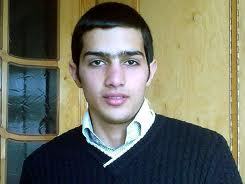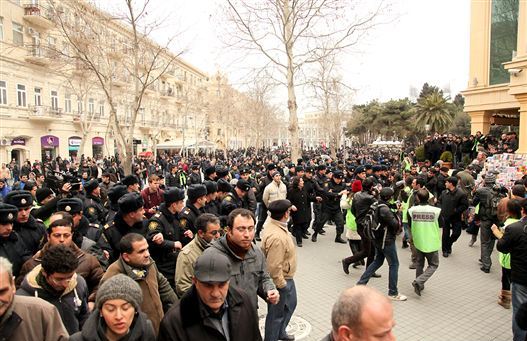Norwegian Helsinki Committee, Article 19 and Index on Censorship are among the NGOs behind the statement comdemning the latest conviction of a youth activist in Azerbaijan.
Savalan (below) was among the first cyber activists targeted in connection  with a series of pro-democracy protests. He was a member of the opposition Popular Front Party’s (APFP) youth group, and was apparently targeted for using Facebook to call for a “Day of Rage” inspired by protests in the Middle East and North Africa.
with a series of pro-democracy protests. He was a member of the opposition Popular Front Party’s (APFP) youth group, and was apparently targeted for using Facebook to call for a “Day of Rage” inspired by protests in the Middle East and North Africa.
The IPGA is deeply concerned by the continued targeting of online activists and calls on the Azerbaijani authorities to immediately release them and cease the continuing clampdown on freedom of expression.
“Jabbar Savalan’s conviction and harsh prison sentence make it clear that it has become quite dangerous to use new media to criticise the authorities or call for protests in Azerbaijan,” said Article 19 Executive Director Agnès Callamard.
Drugs again
Savalan was arrested on 5 February 2011 after posting criticism of the authorities and calls for pro-democracy protests on his Facebook page.
The 20-year-old was convicted by the district court in the eastern city of Sumgayit for allegedly possessing 0.74g of marijuana.
Savalan has no prior history of drug use or drug possession, and claims the drugs were planted on him by the police. The Azerbaijani authorities have a history of using drug possession charges to imprison government critics, including satirical journalist Sakit Zahidov and editor Eynulla Fatullayev (right).
authorities have a history of using drug possession charges to imprison government critics, including satirical journalist Sakit Zahidov and editor Eynulla Fatullayev (right).
Prior to his arrest in February, Jabbar Savalan was followed by police, who arrested him without explanation or reading him his rights. He was handcuffed and manhandled in and out of a police vehicle before being searched at a police station. Police then claim to have found the drugs in his outer jacket pocket.
“All the evidence points to the fact that Jabbar Savalan has been convicted on trumped up charges,” said John Dalhuisen, Europe and Central Asia Deputy Programme Director at Amnesty International.
Real reason – anti-government protests
“It’s clear that the real reason he was tried and now convicted was to punish him for – and dissuade others from – calling for anti-government protests (below, Baku) inspired by events in the Middle East. Jabbar Savalan is being punished for peacefully exercising his right to freedom of expression.”
Jabbar Savalan was convicted despite a blood test showing he had not used drugs.
The conviction was largely based on a confession he was forced to sign and has since retracted. He did not have access to a lawyer during the interrogation.
Amnesty International recently visited Jabbar Savalan’s family and they were adamant that the activist has no history of drug use. This  was confirmed by his friends and classmates. One told Amnesty International: “Jabbar is not a smoker and doesn’t drink alcohol at all – there is no way he would be a drug user.”
was confirmed by his friends and classmates. One told Amnesty International: “Jabbar is not a smoker and doesn’t drink alcohol at all – there is no way he would be a drug user.”
Savalan’s lawyer, Anar Gasimov, told Human Rights Watch that after the trial, a local police official warned him about possible repercussions for “working against the interests of the state.”
“As with journalist Eynulla Fatullayev, the charges against online activist Jabbar Savalan are widely believed to be fabricated, demonstrating the government’s refusal to protect its citizens’ rights to both protest and free expression,” said Index on Censorship Assistant Editor Natasha Schmidt.
Dozens detained
Since Savalan’s arrest, the authorities have detained dozens of protest organisers and hundreds of protesters and used excessive force to disperse crowds. Blogger and youth activist Bakhtiyar Hajiyev remains in detention, standing trial on politically motivated charges of evading military service, for which he faces up to two years’ imprisonment. Hajiyev was one of the administrators of a Facebook page behind some of the pro-democracy protests.
Another of the administrators, Strasbourg-based blogger Elnur Majidli (below), faces up to 12 years’ imprisonment on charges of publically appealing for the violent overthrow of power, based on his online activities calling for protests and criticising the authorities. Majidli is the first cyber activist based outside of Azerbaijan to be criminally charged.
On May 3, Baku’s Nasimi District Court remanded a human rights defender, Vidadi Isganderov, to two months in pretrial custody for allegedly interfering with the November 2010 parliamentary election.
Isganderov, a lawyer by education, is the head of “Support for Protection of Democracy,” a nongovernmental group that does a wide range of human rights work. Isganderov had defended the rights of homeowners who had been swindled by bogus construction companies and also those who had been victims of alleged police extortion. In past years, Interior Ministry officials had brought several defamation charges against him, but none resulted in convictions.
Isganderov was arrested twice in April for participating in unsanctioned opposition rallies and was sentenced on misdemeanor charges of disobeying police orders. When his second sentence was about to expire, instead of releasing him, the authorities initiated the new criminal charge of interference in elections against him.
“Jabbar Savalan’s conviction – and the recent arrests of other protest organisers – show how fragile the environment for freedom of expression in Azerbaijan is right now – and just how far the authorities are prepared to go to silence dissenting voices. Jabbar Savalan is a prisoner of conscience and he must be released immediately and unconditionally”, added John Dalhuisen.
Related articles:
Fifty Fatullayevs protested the continued detention of Azerbaijani journalist
Azerbaijan: opposition activist and journalist abducted and beaten
Azerbaijan: at least 30 protesters sentenced
Azerbaijan: authorities detain dozens to prevent protests
Human Rights House Azerbaijan closed down by Azerbaijani authorities
Azerbaijan: Free speech activists call on journalist’s release
Fatullayev’s fate – in the hands of the Council of Europe Committee of Ministers
Azerbaijan: Human rights organisations demand to comply with European Court decision
Remembering a brave journalist in Azerbaijan
Azerbaijan: On 5. anniversary of editor’s murder, Article 19 calls to bring perpetrators to justice
Police use pressure against journalists in Azarbaijan
Azerbaijan: joint mission concerned by state of freedom of expression ahead of elections
Azerbaijan: freedom of expression situation has deteriorated over the past five years
Azerbaijani bloggers sentenced
No news is not good news regarding freedom of expression in Azerbaijan
Profound pessimism about Azerbaijan’s elections
Azerbaijan: free expression under attack before elections
Azeri authorities clamp down on election-related demonstration
New York Times’ article: Police in Azerbaijan arrest antigovernment protesters
Statements:
Statement on the closing of the Human Rights House Azerbaijan
Youth activists targeted as freedom of expression clampdown continues


